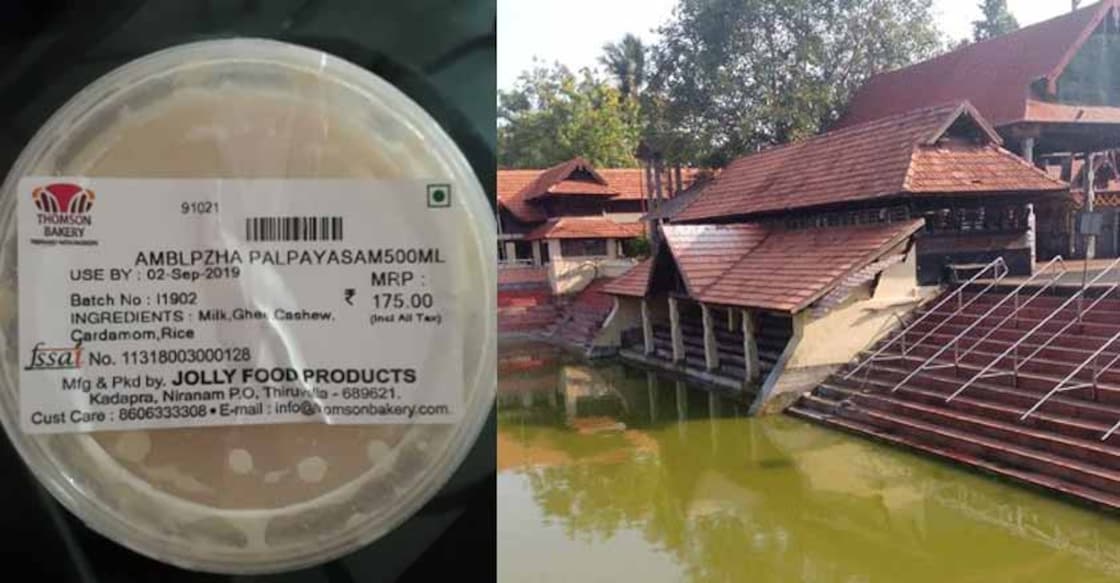Bakery sells 'Ambalapuzha Palpayasam', Devaswom Board swings into action, files case

Mail This Article
Kerala's sacred temple offerings, famed for their heavenly taste, have turned out to be a major business temptation.
Last year, a Singapore-based agri-business giant made a stealthy move to secure for itself the patent of the name that virtually defines Sabarimala: Aravana. This year, as Onam nears, a local bakery in a small town named Kadapra in Pathanamthitta district was found selling an equally sacred 'prasadam' from their outlet: Ambalapuzha Palpayasam.
Made of sweetened rice and milk, the 'payasam' is the main offering of Ambalapuzha Sri Krishna Temple under the Travancore Devaswom Board (TDB). Once it got wind of the sale, the TDB quickly initiated legal proceedings against Jolly Food Products and its outlet Thomson Bakery for selling the temple offering.
Social media revolt
Kadapra is some 20 km east from the Ambalapuzha Sri Krishna Temple. It is said that the bakery in Kadapra had been selling 'Ambalapuzha Palpayasam' for nearly a month before the temple was alerted. “Some devotees had made this a big issue on social media and that was how we came to know of it,” said Baiju, the TDB's Harippad deputy commissioner.
By then, the bakery had taken out the temple's name from the 'payasam' they were selling. “Though our people went to the bakery they could not get hold of a container that was sold as Ambalapuzha palpayasam,” Baiju said. The board, however, was given such a container by a devotee who had bought it from the bakery.
Shrewd subtractions
The Ambalapuzha legend was used shrewdly, making sure the bakery was legally insulated even if someone raised the charge of trademark violation. Instead of writing the name of the place in full, the sticker on top of the container had shrunk Ambalapuzha to 'Amblpzha'. So it was 'Amblpzha Palpayasam'.
The bakery was also selling the 'offering' at a higher price. If at the temple, 500ml was priced at Rs 160, the bakery charged Rs 175.
“Ambalapuzha Palpayasam is a 'prasadam' (sacred offering) that is given out only through the counters of the Devaswom Board. Now we gather that the bakery had managed to sell the 'payasam' even in Thiruvananthapuram,” TDB president A Padmakumar told Onmanorama.
Facebook apology
Jolly Food Products, though it seems to have insulated itself from any violation by using a mutilated name, did not brace for a showdown. The company swiftly apologised. “It was an inadvertent mistake that appeared on our sticker. We soon called up the authorities and gave our written apology,” a spokesperson for the company told Onmanorama. The bakery's plastic 'payasam' containers now sport a new sticker with just 'Palpayasam' printed on it. The price is the same: Rs 175 for 500 ml.
The TDB president is unmoved. “An apology is valid for interpersonal relationships. This is a violation of a sacred practice. It will not be condoned,” Padmakumar said. “I am also told that they have given an apology on Facebook,” he said. A case has already been filed before the Alappuzha Superintendent of Police.
Duplicate trouble
The TDB is especially worried about the possible erosion of trust among the faithful. “The bakery 'payasam' felt too spicy and seems to have used sugar in large quantities to get the near yellow colour for which Ambalapuzha Palpayasam is known for. At the temple, the 'payasam' is prepared keeping in mind that it was an offering to the Lord. Its divine taste just cannot be explained even by the ingredients used,” said Baiju, the deputy commissioner.
There are other dangers as well. “What if food poisoning results from the consumption of the 'payasam' made in bakery units. Since it goes in the name of Ambalapuzha Palpayasam, the temple will be held accountable,” the deputy commissioner said.
A brash King's debt

The 'payasam' offering in the temple is said to be a medieval ruler's never-ending debt to Lord Krishna. Lore has it that the King, who thought too much about his skills as a chess player, once asked an old sage to sit with him for a game of chess. Confident of his victory, the King told the sage that he could ask for anything he wants if he wins.
The humble sage said he wanted only a few grains of rice. “Just a few grains of rice,” the King asked. “Just a few grains of rice that can fill each of the 64 squares in this board,” the sage said. “How would you want it,” the King asked. “Every square should contain double the number of grains in the previous square. You can begin with putting one small grain in the first square,” the sage said. An old man with such frugal needs. The king was touched.
Exponential growth trap
The game began and in less than 10 moves the King fell. Now, he had his promise to keep. The king started with one grain in the first square. Two in the second, four in the third, eight in the fourth, and 16 in the fifth. The King's smug smile soon vanished. Exponential growth just knocked the King blank.
At the half way stage, on the 32nd square, he had to place 2 billion grains. And on the 64th square the requirement was 9 million trillion grains. Even before the half way stage the King was baffled by the explosion of quantity. He had no idea how he would ever provide the old man.
Finally, the sage revealed himself to be none other than Lord Krishna. "Don't worry about your debt. Just serve palpayasam daily to pilgrims who reach the temple," the Lord said.
(N.B: There is no way the debt could have been redeemed but the 'palpayasam' is not served free now. Half a litre is charged Rs 160. What's more, it has to be booked in advance.)


